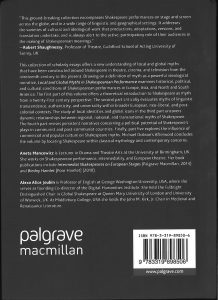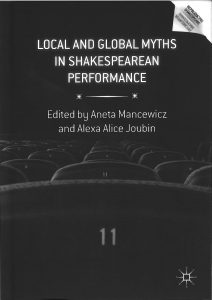Local and Global Myths in Shakespearean Performance
Edited by Aneta Mancewicz and Alexa Alice Joubin
In the Reproducing Shakespeare series (ed. Tom Cartelli and Katherine Rowe)
Palgrave Macmillan, 2018
“Contradictory myths are the foundation to many conversations about Shakespeare today. We can better grasp the significance of globalShakespeare by understanding the cultural logic of the production and consumption of these myths—often articulated in the form of journalistic adoration of universal aesthetics.”
Full text of the Introduction: researchgate.net/profile/Alexa_Joubin
Drawing on a definition of myth as a powerful ideological narrative, this book examines historical, political, and cultural conditions of Shakespearean performances in Europe, Asia, and North and South America.
The first part of this volume offers a theoretical introduction to Shakespeare as myth from a twenty-first century perspective.
The second part critically evaluates myths of linguistic transcendence, authenticity, and universality within broader European, neo-liberal, and post-colonial contexts.
The study of local identities and global icons in the third part uncovers dynamic relationships between regional, national, and transnational myths of Shakespeare.
The fourth part revises persistent narratives concerning a political potential of Shakespeare’s plays in communist and post-communist countries.
Finally, part five explores the influence of commercial and popular culture on Shakespeare myths. Michael Dobson’s Afterword concludes the volume by locating Shakespeare within classical mythology and contemporary concerns.
TABLE of CONTENTS https://www.palgrave.com/gp/book/9783319898506
This collection of scholarly essays offers a new understanding of local and global myths that have been constructed around Shakespeare in theatre, cinema, and television from the nineteenth century to the present. Drawing on a definition of myth as a powerful ideological narrative, Local and Global Myths in Shakespearean Performance examines historical, political, and cultural conditions of Shakespearean performances in Europe, Asia, and North and South America. The first part of this volume offers a theoretical introduction to Shakespeare as myth from a twenty-first century perspective. The second part critically evaluates myths of linguistic transcendence, authenticity, and universality within broader European, neo-liberal, and post-colonial contexts. The study of local identities and global icons in the third part uncovers dynamic relationships between regional, national, and transnational myths of Shakespeare. The fourth part revises persistent narratives concerning a political potential of Shakespeare’s plays in communist and post-communist countries. Finally, part five explores the influence of commercial and popular culture on Shakespeare myths. Michael Dobson’s Afterword concludes the volume by locating Shakespeare within classical mythology and contemporary concerns.



